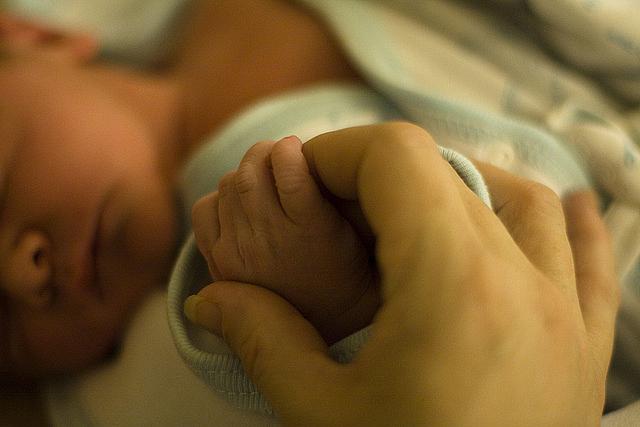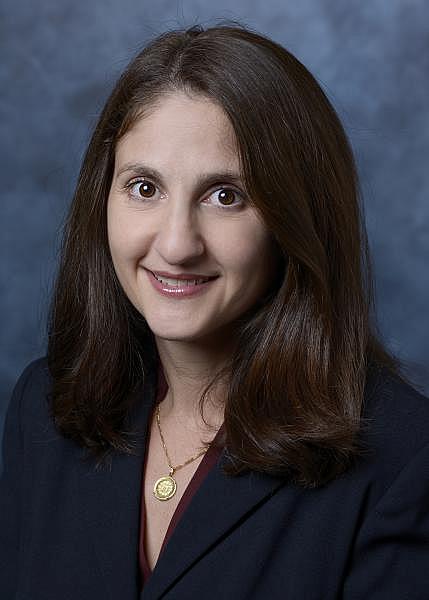How a famous hospital turned around its low rate of screening moms for depression

With two maternal mental health bills on the California governor’s desk and one already signed, a Los Angeles hospital’s work to screen new mothers for depression could soon become a statewide model.
Cedars-Sinai in Los Angeles worked hard to bring up its low rate of screening postpartum women for depression. If signed, one of the new bills would require obstetric teams to do the same.
The hospital’s screening success is largely due to the dogged persistence of clinical psychologist Eynav Accortt, who also testified in support of the statewide screening bill.
“We are working to normalize mental health as part of postpartum health,” Accortt said. “It doesn’t just affect the mothers. It affects the entire family. It affects the spouse. It affects older children. It affects extended family.”
Left untreated, depression during pregnancy can put women at risk for preterm births and low birth weight babies. Postpartum depression can hinder mother-baby attachment, and negatively impact the physical and emotional development of the baby in childhood and beyond.
The hospital’s efforts are part of a broader effort among health care systems to recognize depression in new mothers earlier and get them the help they need. In California, Kaiser Permanente and Dignity Health are also taking steps to improve mental health care for pregnant and new mothers.
Bumping up the rates
When Accortt started at Cedars-Sinai in 2015, fewer than 10 percent of new mothers were screened for depressive symptoms, she said. This was despite a 2014 hospital-wide policy that mandated depression screening for every patient that came through its doors.
At the time, pregnant women were supposed to be screened in the labor and delivery ward.
“It just seemed like due to the emergency nature of our admissions — women are in active labor, they could be bleeding — they really just needed their physical health taken care of immediately,” Accortt said. “And there wasn’t really time or it wasn’t really the right time to ask these questions about depression.”
With help from the hospital’s OB-GYN and nursing leaders, Accortt brought together four departments (OB-GYN, nursing, psychiatry and social work) to plot ways to increase the number of women screened for depressive symptoms in the days immediately following birth.
In Los Angeles, 13.6 percent of mothers experience depressive symptoms after having their babies, according to new data released by the California Department of Public Health and Kids Data. Nationwide, about 11 percent of women experience symptoms of postpartum depression, according to the Centers for Disease Control and Prevention. But in some states, the figure approaches 20 percent.
A huge jump in screenings
At Cedars-Sinai, Accortt found there was no standard process for referring new mothers to specialists, and nurses weren’t formally trained to test for signs of depression. She helped implement their new screening, education and referral program. She also moved screenings from labor and delivery to the less harried setting of the postpartum unit.

Educating hospital staff proved crucial. Accortt gave presentations throughout the hospital, sought buy-in from the hospital’s administration, and brought in the Los Angeles-based organization Maternal Mental Health NOW to help with trainings. That organization also provided resources and materials that nurses could give to mothers in need of specialty care.
“We know from decades of research that screening alone is ineffective,” said Accortt. “If you don’t provide educational materials, if you don’t provide specific referral information that is vetted, screening is useless.”
The screening bill on Gov. Jerry Brown’s desk would not only require doctors to screen new mothers for depression, but would also require health insurance companies to help mothers find a therapist, and connect doctors to psychiatric specialists.
Screening alone doesn't always work
Despite the impressive jump in screening rates, Accortt and her team have not been able to actually identify many women with depressive symptoms. The rates for those who screened positive for depressive symptoms at Cedars-Sinai were just 0.4 percent of the new mothers they tested, far lower than the national prevalence of postpartum depression — 11 percent.
“We realize this, and we’re not going to blow smoke,” Accortt said. “We’re going to say, this is an issue and we need to solve it.”
This could partly be a training issue. Many of the nurses tasked with administering the standard questionnaire were not comfortable asking questions about depression and suicidal thoughts, Accortt said.
Nurses also need training in how to field questions from the mother herself. To that end, Accortt and her team just created a video that features a social worker role-playing with a new mother.
“Really nuanced training is needed,” she said. “We realized that we need to model how to do every little step. How to prepare the room. For example, the nursing staff needs to have the vocabulary and be prepared to kindly and respectfully ask these others to leave the room because you can imagine that if a mother-in-law was in the room, that may, it may not, but it may sway a mother’s responses to questions about depression.”
Racial disparities persist
Of the 7,900 women who gave birth at Cedars-Sinai between April 2017 and June 2018, 633 of them were black. Only two of these women were assessed as high risk for depression, even though 78 of them already had mental health diagnoses in their medical records, according to Accortt.
In Los Angeles County, black women are twice as likely to be depressed during pregnancy than white women. After birth, about 28 percent of black women reported a depressed mood compared to 22.5 percent of white women.
Meanwhile, there is growing awareness of how black women are treated during pregnancy and the births of their children, further brought to light by Serena Williams, Beyoncé, and the work of NPR and ProPublica on maternal mortality.
At Cedars-Sinai, Accortt’s next project is to improve how the hospital screens and treats black women who deliver there. With the help of several local agencies, she and her team will conduct implicit bias training for hospital staff and work on culturally appropriate referrals to treatment for women who screen as high risk for depression. They also plan to add an in-hospital support group for black mothers.
“We have to intervene,” Accortt said. “We need to reduce the stress. We need to reduce the impact that it has on a woman’s physical and mental health.”
The advocacy organization 2020 Mom is also working on the issue in California, developing a “words to use” resource for birth staff serving black mothers.
“We have heard there is much unintended bias and some would say outright disrespect,” said Joy Burkhard, 2020 Mom Executive Director. “We want to create not just a report documenting the problem, but a tool to prevent it.”
**
Correction: An earlier version of this piece incorrectly stated that a screening bill before Gov. Brown would require all hospitals to screen new mothers for depression. The bill requires all obstetric providers to perform screenings.
[Photo by Bridget Coila via Flickr.]

